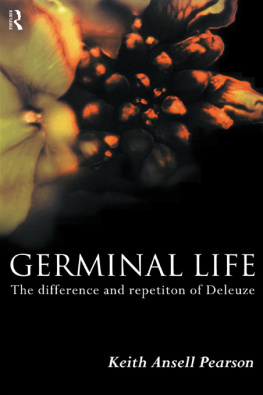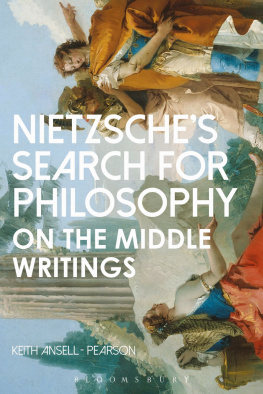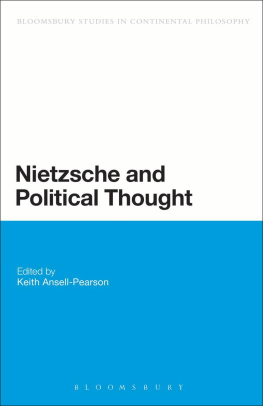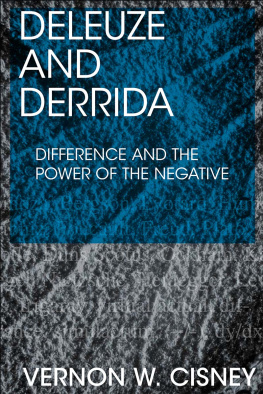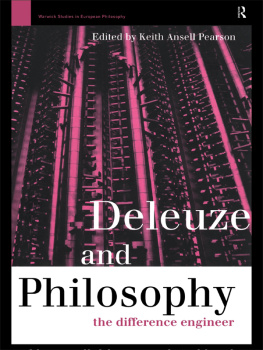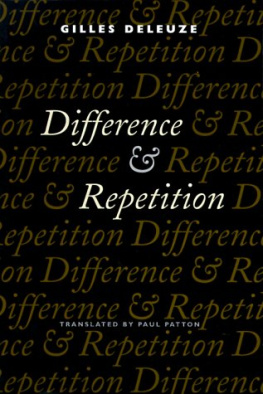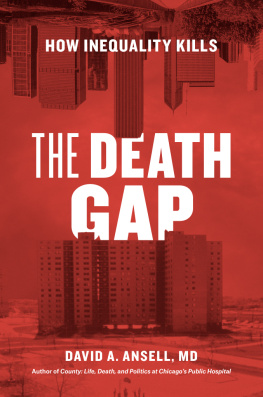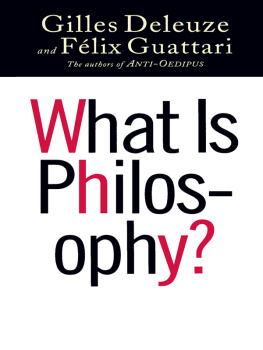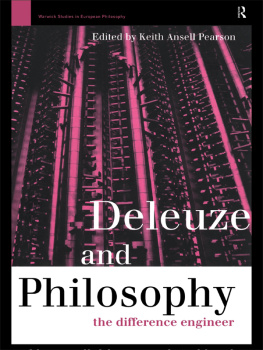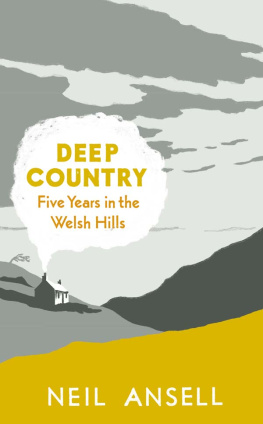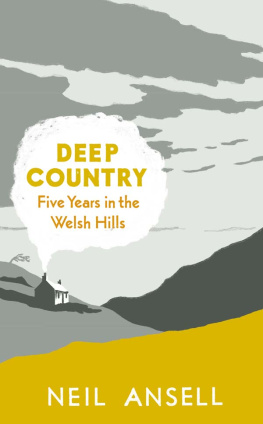Keith Ansell-Pearson - Germinal Life: The Difference and Repetition of Deleuze
Here you can read online Keith Ansell-Pearson - Germinal Life: The Difference and Repetition of Deleuze full text of the book (entire story) in english for free. Download pdf and epub, get meaning, cover and reviews about this ebook. publisher: Routledge, genre: Science. Description of the work, (preface) as well as reviews are available. Best literature library LitArk.com created for fans of good reading and offers a wide selection of genres:
Romance novel
Science fiction
Adventure
Detective
Science
History
Home and family
Prose
Art
Politics
Computer
Non-fiction
Religion
Business
Children
Humor
Choose a favorite category and find really read worthwhile books. Enjoy immersion in the world of imagination, feel the emotions of the characters or learn something new for yourself, make an fascinating discovery.
- Book:Germinal Life: The Difference and Repetition of Deleuze
- Author:
- Publisher:Routledge
- Genre:
- Rating:3 / 5
- Favourites:Add to favourites
- Your mark:
- 60
- 1
- 2
- 3
- 4
- 5
Germinal Life: The Difference and Repetition of Deleuze: summary, description and annotation
We offer to read an annotation, description, summary or preface (depends on what the author of the book "Germinal Life: The Difference and Repetition of Deleuze" wrote himself). If you haven't found the necessary information about the book — write in the comments, we will try to find it.
Germinal Life: The Difference and Repetition of Deleuze — read online for free the complete book (whole text) full work
Below is the text of the book, divided by pages. System saving the place of the last page read, allows you to conveniently read the book "Germinal Life: The Difference and Repetition of Deleuze" online for free, without having to search again every time where you left off. Put a bookmark, and you can go to the page where you finished reading at any time.
Font size:
Interval:
Bookmark:

GERMINAL LIFE
Germinal Life carries forward Deleuze and Guattaris project of a philosophy of vitality, in creative dialogue with the latest developments in the sciences of life and theories of technology. An innovative mediation at the boundary between philosophy, science, and cultural studies.
Brian Massumi, Australian National University
Germinal Life is a brilliantand criticalreworking of Deleuze, mapping a new tradition of biophilosophy With this follow-up to Viroid Life, Keith Ansell Pearson has established himself as one of Britains most exciting young philosophers.
David Wood, Vanderbilt University
This is a very important book on a topic that is going to be of increasing importance over the next several years. It addresses the overlapping audiences of continental philosophy, cultural studies, critical theory and science studies to provoke a rethinking of the boundaries dividing life from non-life, the human and the post-human (super and sub-human).
Elizabeth Grosz, SUNY at Buffalo, USA
Keith Ansell Pearson approaches the work of Gilles Deleuze with the precision of a diamond cutter, exposing brilliant facets of thought beyond the human condition.
Stanley Shostak, University of Pittsburgh
Germinal Life: The Difference and Repetition of Deleuze is the highly successful sequel to Viroid Life: Perspectives on Nietzsche and the Transhuman Condition. Where Viroid Life provided a compelling reading of Nietzsches philosophy of the human, Germinal Life is a highly original and incisive study of the biophilosophical aspects of Deleuzes thought. In particular, Keith Ansell Pearson provides fresh and insightful readings of Deleuzes work on Bergson and skillfully shows how Bergsonism is the crucial factor in any encounter with Deleuzes philosophy of life.
Germinal Life also provides new insights into Deleuzes most famous texts, Difference and Repetition and A Thousand Plateaus. Ansell Pearson investigates Deleuzes relation to some of the most original thinkers of modernity, from Darwin to Freud and Nietzsche, and explores the connections between Deleuze and more recent thinkers such as Adorno and Merleau-Ponty. Ansell Pearson also offers imaginative readings of works of literature such as Hardys Tess. Concluding with reflections on the figuration of the fold and superfold in Deleuze, Germinal Life confronts what ultimately it might mean to think beyond the human.
Keith Ansell Pearson is Professor of Philosophy at the University of Warwick. He is the author of Viroid Life and editor of Deleuze and Philosophy, also published by Routledge.
GERMINAL LIFE
The difference and repetition of Deleuze
Keith Ansell Pearson

First published 1999
by Routledge
11 New Fetter Lane, London EC4P 4EE
This edition published in the Taylor & Francis e-Library, 2003.
Simultaneously published in the USA and Canada
by Routledge
29 West 35th Street, New York, NY 10001
1999 Keith Ansell Pearson
All rights reserved. No part of this book may be reprinted or reproduced or utilized in any form or by any electronic, mechanical, or other means, now known or hereafter invented, including photocopying and recording, or in any information storage or retrieval system, without permission in writing from the publishers
British Library Cataloguing in Publication Data
A catalogue record for this book is available from the British Library
Library of Congress Cataloging in Publication Data
Ansell Pearson, Keith, 1960
Germinal Life: The difference and repetition of Deleuze/Keith Ansell Pearson.
p. cm.
Includes bibliographical references and index.
1. Deleuze, Gilles. 2. Bergson, Henri, 18591941Influence.
I. Title.
B2430.D454A57 2000 9841197
194dc21 CIP
ISBN 0-203-00574-0 Master e-book ISBN
ISBN 0-203-16084-3 (Adobe eReader Format)
ISBN 0-415-18350-2 (hbk)
ISBN 0-415-18351-0 (pbk)
FOR JASMINE AND RICHARD
Immanence can be said to be the burning issue of all philosophy because it takes on all the dangers that philosophy must confront, all the condemnations, persecutions, and repudiations that it undergoes.
(G.Deleuze and F.Guattari, What is Philosophy?, 1991)
This is an ancient and eternal story: what formerly happened with the Stoics still happens today, as soon as any philosophy begins to believe in itself. It
tyrannical drive itself, the most spiritual
will to power, to the creation of the world, to the causa prima.
(F.Nietzsche, Beyond Good and Evil, 1886)
CONTENTS
ACKNOWLEDGEMENTS
For helping this book to move along and germinate, I am indebted to the following people: Gregory Adamson, Justine Baillie, Richard Beardsworth, Catherine Dale, Robyn Ferrell, Elisabeth Grosz, Brian Massumi, John Mullarkey, John Protevi, Robert Spaven, James Williams, and Tony Bruce at Routledge. For their general support and encouragement over the past few years, as well as the inspiration provided by their own work, I extend my thanks to colleagues and graduates at Warwick and to the following: Eric Alliez, Gary Banham, Sebastian Barker, Constantin Boundas, Howard Caygill, Daniel W.Conway, David E.Cooper, Simon Critchley, Michael Dillon, Diane Morgan, David Musselwhite, David Owen, Liam OSullivan, Noel OSullivan, and David Wood.
A NOTE ON TRANSLATIONS
Readers should note that in many instances translations from the French and German have been modified (on most occasions only slightly) and this is indicated in the text only now and again. Full details of my references and sources can be found in the extensive bibliography provided at the end of the book. I am grateful to Melissa McMahon for allowing me to freely use her unpublished translation of Deleuzes 1956 essay on Bergson and difference, a new version of which is to be published in John Mullarkeys collection of essays The New Bergson (Manchester University Press, forthcoming).
INTRODUCTION
Repeating the difference of Deleuze
In no small measure, the intellectual lineage is straight from Weismann to today.
(Kauffman 1995:274)
Put bluntly, closed systems are bound to be finished.
(Adorno 1966:35; 1973:27)
I
The aim of this book is to illuminate the character of Deleuzes philosophy by situating it in the context of a neglected modern tradition, that of modern biophilosophy, which runs from Darwin and Weismann through to Bergson and Freud, and which also encompasses the work of a diverse and little-known group of thinkers such as Raymond Ruyer, Gilbert Simondon, and Jacob von Uexkll. The fact that this trajectory of thought going back to the neo-Darwinism of Weismann, and exerting a decisive influence on the thought of Deleuze, has been so neglected might explain why to date there has been so little in the way of an incisive philosophical encounter with Deleuzes work. Deleuze is difficult to place in the philosophical discourse of modernity largely, I suspect, because of the peculiar character of his philosophical thought, with its investments in biology and ethology.
Deleuzes turn to a conception of difference in the 1950s entailed a highly distinctive and novel Bergsonism since to write about Bergson at this time, and from the perspective of a concern with difference, was not a task that would have been either fashionable or predictable. Bergson has been an unduly neglected figure within recent continental philosophy. It is part of the brilliance of Deleuzes readings to show the vital importance and continuing relevance of his great texts on time, creative evolution, and memory, for the staging of philosophical problems. I believe that the character of Deleuzes Bergsonism has been little understood, and yet I want to show that it plays the crucial role in the unfolding of his philosophy as a philosophy of germinal life. In this study the focus is on Bergsons conception of creative evolution and on the way in which an encounter with it can be shown to be of crucial importance for any attempt to comprehend and work through some of the central problems of philosophic modernity. It is through Bergsonism that Deleuze seeks to re-invent this modernity and to articulate a radical project for philosophy. Philosophy is a highly autonomous practice for Deleuze and the distinctive task he prescribes for it, from his early work on Bergson to his last major work, co-authored with Guattari,
Next pageFont size:
Interval:
Bookmark:
Similar books «Germinal Life: The Difference and Repetition of Deleuze»
Look at similar books to Germinal Life: The Difference and Repetition of Deleuze. We have selected literature similar in name and meaning in the hope of providing readers with more options to find new, interesting, not yet read works.
Discussion, reviews of the book Germinal Life: The Difference and Repetition of Deleuze and just readers' own opinions. Leave your comments, write what you think about the work, its meaning or the main characters. Specify what exactly you liked and what you didn't like, and why you think so.

